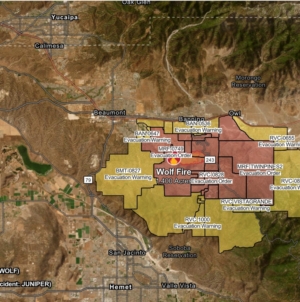-
California Fire Evacuation Map Shows Where People Told to ‘Leave Now’ - 25 mins ago
-
Cancer Curtailed British Royal Family’s Public Engagements - 30 mins ago
-
Royal Tradition Ends After 156 Years—King Charles Ditches Royal Train for Helicopters - 60 mins ago
-
Gaza City Cafe Hit by Deadly Strike - about 1 hour ago
-
Lakers, LeBron James Rumors Receive Huge Update - 2 hours ago
-
Teen Mt. Whitney hiker who walked off 120-foot cliff in delirium makes slow recovery, family says - 2 hours ago
-
Dangerous Heat Grips Much of Europe, With More to Come - 2 hours ago
-
North Korea Ignores Trump’s Overtures - 2 hours ago
-
Trump Vowed to Dismantle MS-13. His Deal With Bukele Threatens That Effort. - 3 hours ago
-
WWE Legend Ric Flair Set To Undergo Surgery - 3 hours ago
California Proposes Decriminalizing Welfare Fraud
California lawmakers have introduced a proposal that would decriminalize certain forms of welfare fraud.
Why It Matters
The proposal to decriminalize small-scale welfare fraud in California highlights a broader debate about how the justice system should handle low-level financial offenses, particularly those involving vulnerable populations. Supporters argue that many alleged fraud cases stem from administrative mistakes rather than deliberate wrongdoing, and that criminalizing errors as minor as $25 disproportionately harms low-income individuals.
Opponents, however, warn that loosening penalties could encourage broader abuse of public assistance programs and undermine public trust in government services. The legislation comes at a politically sensitive time, as Democrats nationally face criticism from Republicans and some centrist voters for being perceived as softer on crime. Critics argue that measures like this could reinforce those perceptions and become potent talking points in future elections. However, the proposal comes at a time where the Department of Government Efficiency (DOGE), established by President Donald Trump and led by Elon Musk, has been set up to investigate possible fraud taking place in government agencies and having welfare agencies take the administration into their own hands is in many ways what DOGE was set up to do.

Rich Pedroncelli/AP
What To Know
California lawmakers are considering a proposal that would decriminalize certain types of welfare fraud under $25,000, according to Fox News.
Introduced by Democratic State Senator Lola Smallwood-Cuevas, Senate Bill 560 aims to eliminate criminal penalties for welfare overpayments stemming from administrative errors or minor infractions. The legislation, introduced in February, seeks to shift the handling of such cases from the criminal justice system to local welfare agencies.
Under SB 560, individuals would not face criminal charges for overpayments under $25,000 if the errors were determined to result from administrative mistakes, such as issues in the Statewide Automated Welfare System (CalSAWS). The bill also proposes eliminating criminal penalties for attempted welfare fraud involving less than $950.
“This bill is about keeping families out of the criminal justice system for making administrative errors,” the senator wrote in an April 8 Instagram post. “It offers a smarter, more humane approach by allowing counties to resolve most overpayment cases administratively, holding people accountable without criminalizing poverty.”
However, the proposal has raised concerns among critics who argue it could weaken deterrents against fraud.
According to the California Department of Social Services, common types of welfare fraud include failing to report income, listing ineligible or non-resident children on aid applications, and concealing the presence of another parent in the household. In Los Angeles County alone, investigators review 15,000 to 20,000 welfare fraud referrals annually, identifying fraud in about 5,000 to 8,000 cases. Of those, approximately 200 cases are referred to the district attorney’s office, with a 95 percent conviction rate.
What People Are Saying
Lola Smallwood-Cuevas told Fox News Digital: “California’s safety net should lift families up, not trap them in poverty. Right now, a missed deadline or paperwork mistake can lead to felony charges that tear families apart—even when there’s no intent to deceive.”
What Happens Next
The legislation is set for a hearing on May 5.
Source link



















